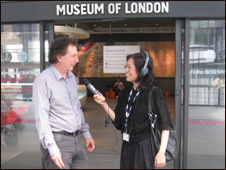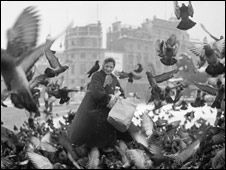London Street Photography 倫敦街頭攝影展
London Street Photography 倫敦街頭攝影展
The script of this programme 本節目臺詞
收聽與下載
Feifei: 喜歡攝影嗎?歡迎你跟隨楊莉一起看看《倫敦街頭攝影展》!
Yang Li: I’ve just come to one of my favourite museums in London. Can you guess which one? It is the Museum of London. By the way, do you know it is the largest urban museum in the world? 世界上最大的城市博物館。 At the moment there is a very interesting exhibition going on which is called ‘London Street Photography’. If you are interested in photography today you are in for a treat. Follow me to find out more about this exhibition.

Yang Li interviewing Mike Seaborne
Mike: Well, I’m Mike Seaborne, and I’m senior curator of photographs at the Museum of London, and curator of this exhibition. And I'm also a photographer.
Yang Li: 那是倫敦博物館的高級館員 senior curator Mike, 他本人也是一位攝影師 a photographer. 他說,這次展覽要探索三個主題。請大家注意聽這三個主題都是什么?What are the three themes?
Mike: There are really three themes that the exhibition is trying to explore. One is looking at London in the past, over a 170 year period, and doing it through this particular kind of photography, which I think people can relate to very easily. The second is to tell a story about London and how it’s changed over that time, as reflected through the photographs. You know, you see how London has changed physically, but you also see how people behave differently and dress differently, and relate to each other differently. And thirdly, we wanted to explore how the changing technology of photography has enabled different kinds of photographs to be taken at different periods.Obviously, we’re covering the whole of the history of photography, from the very earliest, and very, very basic equipment that was very limited in what it could do, right the way through to the present day, when everybody carries a camera in their mobile phone and can just snap like that.
Yang Li: 他說,第一個主題就通過街頭照片來看看倫敦過去170年來的歷史變遷 how has London evolved historically. 第二,領略一下倫敦的人文變化,比如行為和裝束以及人際關系的變化 how has London changed culturally. 第三,就是探索攝影技術的發展 to explore the changing technology of photography. 不過,怎樣才能讓參觀者領略欣賞街頭照片的獨特藝術魅力呢? Look for these expressions: an element of chance 機遇,preconceived ideas 預先設想,spontaneously 即興地,a juxtaposition 物體前后或左右之間的對比。
Mike: Street photography was a particular genre, and I think what really characterises street photography is what I call an element of chance. This is the photographer not having preconceived ideas about what they’re going to photograph but just literally wandering through the streets and just reacting to something that happens.
Yang Li: Spontaneously?
Mike: Spontaneously, or possibly the photographer just sees a juxtaposition of something – this one object or person in relation to another, or something in the background. So there’s this element of chance.
Yang Li: All these are special features that characterise street photography. But how did the visitors like the exhibition? Pay attention to these phrases: come on 發展 candid shots 抓拍。
Woman 1: Very interesting, because, you know…I mean, you live in London, but you don’t really take that amount of notice until you see it in black and white. It’s so marvellous!

This dramatic picture by Henry Grant captures a familiar London sight.
Woman 2: An interesting and fascinating exhibition, seeing how things have changed, and yet some things seem to have stayed the same from… through the years. Thoroughly enjoyed it.
Woman 3: Yes, I found it interesting on two levels because you can see how photography has come on over the years, as well as seeing how London and the people have changed. And as you come more up-to-date you get more of these candid shots, whereas they’re rather more formal to start off with.
Yang Li: Interesting and fascinating. Those comments have certainly put a smile on the organiser's face. Mike again:
They really are fascinated by the fact that most of the photographs in this exhibition were taken with technology that we no longer use, and they create something which is different to seeing an image on the screen. It’s a print, it’s on paper and it’s got surface qualities to it which make it a different experience and also because they’re organised in a way which tells a narrative. And I think that seems to have worked very well.
Yang Li: A wonderful narrative indeed 精彩的故事!Would you like to see some images as well? Well, just click here and enjoy our special audio slide show with exhibition images courtesy of The Museum of London. Enjoy and goodbye. 我是楊莉,再會。